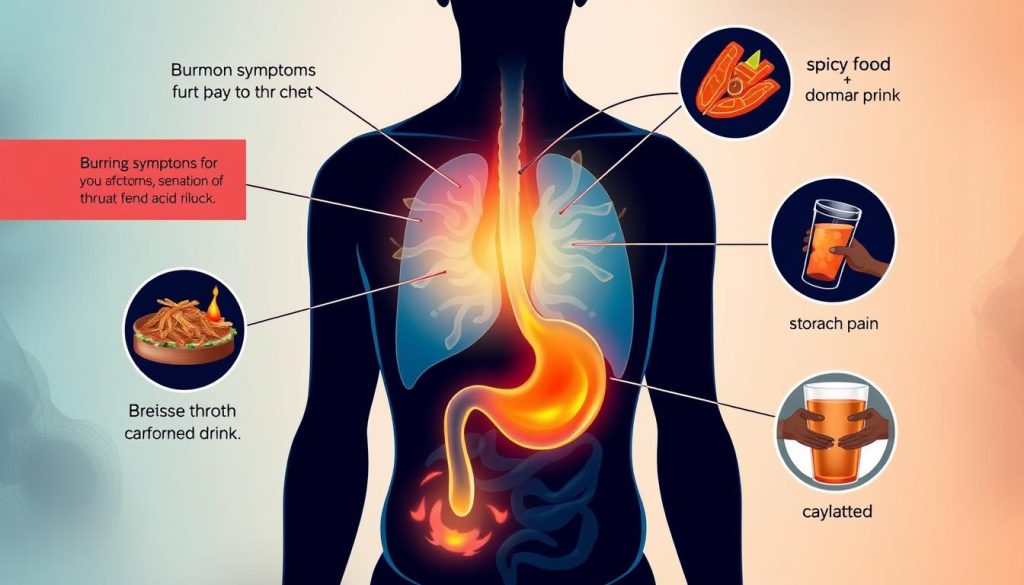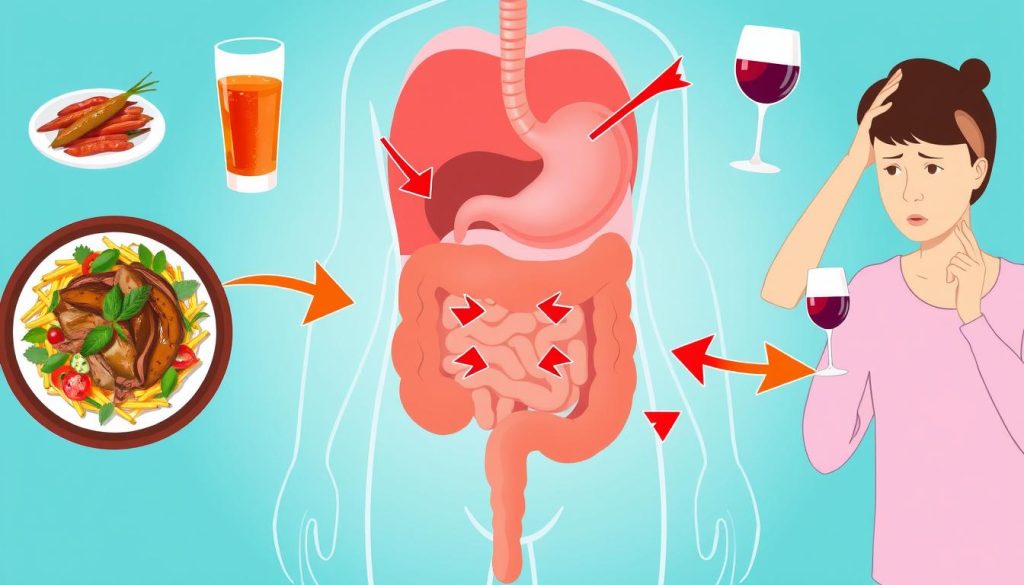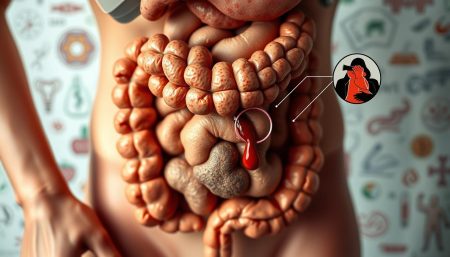Many people search for answers about acid reflux because of its discomfort. Symptoms like heartburn and regurgitated food can disrupt daily life. Knowing what triggers acid reflux is key to managing it and feeling better.
For some, acid reflux turns into a chronic condition called GERD. GERD symptoms can last long and affect health. It’s important to understand acid reflux to improve our wellbeing.
This journey to understand acid reflux goes beyond just knowing what it is. We’ll look at the physical battle it causes and how lifestyle and diet play a role. It’s a path that needs compassion, for ourselves and for others dealing with this issue.
Key Takeaways
- Identify acid reflux signs and acknowledge their impact on quality of life.
- Understanding the causes of acid reflux is crucial for effective management.
- Recognize dietary and lifestyle choices as potential acid reflux common triggers.
- Explore the distinction between occasional acid reflux and chronic GERD symptoms.
- Adopt informed perspectives for personal health strategies against acid reflux.
Understanding Acid Reflux and GERD
To understand acid reflux and GERD, we need to know the details. It’s important for those with symptoms and for everyone’s health. Knowing about these conditions helps us take care of our stomachs better.
Defining Acid Reflux and How It Differs from GERD
Acid reflux happens when stomach acid flows back into the esophagus. This can hurt and damage the esophagus. GERD is a more serious version of acid reflux. It has worse symptoms that last longer and need doctor help.
The Role of the Lower Esophageal Sphincter
The lower esophageal sphincter (LES) is key to our digestion. It stops stomach acid from going back up into the esophagus. If the LES doesn’t work right, acid reflux can happen. Knowing how it works helps us find better treatments.
Prevalence and Impact on Quality of Life
Many adults have acid reflux, which affects their daily lives. Here’s some data to show how big of a problem it is:
| Condition | Percentage of Population Affected | Impact on Quality of Life |
|---|---|---|
| Occasional Acid Reflux | 40% | Moderate, intermittent discomfort |
| Chronic Acid Reflux (GERD) | 20% | Severe, daily interference with activities |
These numbers show how important it is to manage acid reflux. Making lifestyle changes can help improve life for those affected.
Recognizing the Symptoms of Acid Reflux
Acid reflux shows itself in many ways, from mild to severe. It’s important to know the signs early to avoid bigger health problems.
Common Physical Manifestations
People with acid reflux often feel a burning in their chest, known as heartburn. They might also taste something sour or bitter, feel like food is coming back up, or have trouble swallowing. A chronic cough or changes in voice can also be signs, especially if they happen without other health issues.
When to Be Concerned: Persistent Symptoms and Complications
Dealing with acid reflux that doesn’t go away can lead to serious problems. If symptoms happen more than twice a week or really affect your life, you should talk to a doctor. Issues like esophagitis and Barrett’s esophagus, which could lead to cancer, need medical help.
Differentiating Between Acid Reflux and Heart Attack
Telling acid reflux apart from a heart attack is key, as both can cause chest pain. But heart attacks often have other signs like arm, jaw, or back pain, dizziness, and trouble breathing. If you have chest pain with these signs, get help right away.

Knowing the difference between acid reflux and a heart attack can be life-saving. Paying attention to symptoms and understanding their meaning is crucial. It helps you get the right medical care on time.
What Causes Acid Reflux
Exploring the factors causing acid reflux and GERD contributing factors reveals many biological and lifestyle elements. The main heartburn causes come from a mix of body structure, diet, and environment. Each plays a big role in how well the esophagus works.
One key biological factor is hiatal hernia. This happens when the stomach bulges up into the chest. It messes with the esophagus and leads to acid reflux. Obesity also puts extra pressure on the stomach, making GERD symptoms worse.
- Hiatal Hernia
- Obesity and increased abdominal pressure
- Smoking which relaxes the lower esophageal sphincter
- Consumption of foods high in fat, spices, or citric acid
Smoking and eating fatty or spicy foods can also cause acid reflux. These factors causing acid reflux make the lower esophageal sphincter weak. This means it can’t stop stomach acid from coming up.
| Factor | Impact on Acid Reflux |
|---|---|
| Hiatal Hernia | Increases the likelihood of GERD by physically altering stomach position. |
| Obesity | Elevates abdominal pressure, forcing acid back up into the esophagus. |
| Smoking | Relaxes the lower esophageal sphincter, allowing acid escape. |
| Spicy Foods | Can trigger acid release, worsening heartburn condition. |
Knowing these factors helps us make better lifestyle choices and find the right treatments. Understanding how our habits and body shape affect acid reflux is key. It leads to a better way to treat and prevent it.
Dietary Factors and Acidic Foods
Understanding how our diet affects acid reflux is key for managing it. Different foods can cause different reactions in people, so finding what works for you is important. This part talks about acidic foods, alcohol, and caffeine, and how changing your diet can help.
How What We Eat Affects Acid Reflux
The foods we eat play a big role in managing acid reflux. Foods like citrus fruits and tomatoes make our stomachs more acidic, which can make reflux worse. Also, fatty foods take longer to digest, which means stomach acid stays in the stomach longer, increasing the chance of it coming back up.
Identifying Personal Food Triggers
To manage acid reflux well, finding out which foods trigger it is crucial. Keeping a food diary helps track what you eat and when, and any symptoms that follow. This can help you see patterns and know which foods to avoid. Common culprits include spicy foods, mint, chocolate, and acidic foods, but how they affect you can vary.
Alcoholic Beverages and Caffeine: Are They Contributing?
Alcohol and caffeine can make acid reflux worse by relaxing the muscle at the top of the stomach. This makes it easier for stomach acid to flow back up. Drinking alcohol, especially wine and beer, can also make more stomach acid. Caffeine can mess with how well the esophagus works, so it’s important to watch how much you drink.
Changing your diet to help with acid reflux doesn’t mean you have to give up everything you like. It’s about finding a balance and understanding how different foods and drinks affect you. For many, cutting down on caffeine and alcohol can make a big difference in their life.

Hiatal Hernia and Its Role in Acid Reflux
A hiatal hernia is a common but often overlooked cause of acid reflux. It happens when part of the stomach bulges through the diaphragm. This can make acid reflux and GERD worse. The hiatal hernia affects the lower esophageal sphincter (LES), which should keep stomach acids from going up into the esophagus.
People with a hiatal hernia often have acid reflux. They might feel heartburn, chest pain, and regurgitation. Knowing how a hiatal hernia and GERD are connected is key to managing these conditions.
| Condition | Impact on LES | Common Symptoms |
|---|---|---|
| Hiatal Hernia | Weakens the LES | Heartburn, Chest Pain |
| Normal Anatomy | LES Functions Normally | Occasional Acid Reflux |
Those with hiatal hernia and acid reflux can find relief with lifestyle changes and medical help. Recognizing GERD causes like hiatal hernia helps tailor treatments. This approach can make a big difference in managing symptoms.
Learning about hiatal hernia and its impact on acid reflux is empowering. It helps people seek the right care early. Personal stories and testimonials show the value of early detection and proactive management.
Lifestyle Choices Contributing to Acid Reflux
Looking into how our daily habits affect our stomach health is very insightful. Acid reflux affects many people and can be linked to lifestyle choices. These include smoking, drinking alcohol, managing stress, keeping a healthy weight, and staying active.
The Impact of Smoking and Alcohol Consumption
Studies show a strong link between smoking and acid reflux. Smoking weakens the muscle that keeps stomach acids in. Alcohol and GERD also have a connection. Alcohol can irritate the esophagus and make more stomach acid.
Stress and Anxiety: Psychological Factors
Stress can make stress-induced acid reflux worse. It can mess with how our body digests food, leading to more acid and reflux.
The Effect of Body Weight and Exercise Habits
There’s a clear link between body weight and GERD. Being overweight can put more pressure on the stomach, making reflux symptoms worse. On the other hand, exercise for acid reflux can help keep a healthy weight and improve digestion. But, be careful with very intense workouts as they can also increase stomach pressure.
| Lifestyle Factor | Effect on Acid Reflux | Recommended Actions |
|---|---|---|
| Smoking | Weakens esophageal sphincter | Quit smoking |
| Alcohol Consumption | Increases stomach acid | Limit alcohol intake |
| High Stress Levels | Impairs digestion | Engage in stress-reducing activities |
| Excessive Body Weight | Increases abdominal pressure | Maintain healthy weight through diet and exercise |
| Lack of Physical Activity | Contributes to poor digestive health | Incorporate regular, moderate exercise |

Medications and Chemical Triggers
It’s important to know how different substances can make acid reflux worse. Both prescription and over-the-counter medicines can surprise us by causing acid reflux.
Prescription and Over-The-Counter Medications That Can Induce Acid Reflux
Some medicines for other health issues can lead to acid reflux. This includes blood pressure drugs, antibiotics, and some supplements. But, many don’t realize that some over-the-counter medicines can also trigger acid reflux.
For example, pain relievers like aspirin or ibuprofen can weaken the muscle at the bottom of the esophagus. This can make acid reflux worse or even start it.
Understanding the Chemical Culprits
GERD triggers aren’t just in medicines. They also include dietary supplements and food additives. How they affect people can vary a lot, so finding the right treatment is key.
People with GERD should learn about these triggers. They should also talk to their doctor about safer options.
| Medication Type | Common Brands | Possible Acid Reflux Inducement |
|---|---|---|
| NSAIDs | Ibuprofen, Aspirin | May weaken lower esophageal sphincter |
| Antibiotics | Amoxicillin, Tetracycline | Can irritate esophagus leading to symptoms |
| Blood Pressure Medications | Calcium channel blockers | Relaxes LES, increasing acid backflow |
Knowing how acid reflux medicines work can help manage symptoms. This knowledge helps patients talk better with doctors about their treatment plans.
The Importance of Proper Eating Habits
Having proper eating habits is key to avoiding acid reflux. What you eat every day can greatly affect how often you get acid reflux. This shows how important it is to manage your diet well.
Choosing the right foods and eating at the right times is crucial. Eating smaller meals often helps keep your stomach from getting too full. This reduces pressure on the LES, lowering the chance of reflux.
- Eat slowly and chew well to help digestion.
- Stay away from eating too late at night to avoid nighttime reflux.
- Try alkaline foods like bananas, melons, and oats to balance stomach acids.
Knowing which foods to skip is as important as knowing which ones to eat. Foods high in fat, spice, citrus, and caffeine can cause acid reflux. It’s best to eat them less or not at all.
| Food Type | Include | Avoid |
|---|---|---|
| Fruits | Bananas, Melons | Oranges, Lemons |
| Beverages | Herbal teas | Coffee, Alcohol |
| Snacks | Almonds, Yogurt | Chips, Chocolate |
For more tips on dieting for acid reflux, check out this resource on GERD diet guidelines.
Many people have found relief from acid reflux by changing their diet. By sticking to a strict diet and making smart food choices, you can manage and even reduce acid reflux symptoms.
Acid Reflux Treatment and Management Approaches
Managing acid reflux is a journey for many, with different treatments working better for some. Medical science has made big strides in understanding and treating this condition. This offers hope and relief through various treatments.
Insight into prescriptions for GERD is key, along with proven lifestyle changes. This multi-faceted approach helps manage symptoms. Also, a growing interest in alternative medicine for heartburn adds more tools for wellness.
Medical Interventions and Prescriptions
Prescriptions for GERD and other medications are at the heart of traditional treatment. They are tailored to fit individual needs. These include proton pump inhibitors (PPIs) and H2 blockers that lower stomach acid.
For those with persistent symptoms, these treatments can be life-changing. They show how modern medicine can greatly improve life with chronic conditions.
Lifestyle and Diet Adjustments for Symptom Control
Managing acid reflux also means changing diet and lifestyle. Avoiding foods that trigger acid and keeping a healthy weight through diet and exercise can help a lot. Eating smaller, more frequent meals and avoiding late-night eating are practical steps.
These steps, along with medical treatments, empower individuals to control their condition. It’s this balanced approach that leads to relief and resilience.
Role of Natural Remedies and Alternative Medicine
Natural remedies for acid reflux are becoming more popular for a holistic approach. Herbal teas, ginger, and acupuncture are used in alternative medicine for heartburn relief. While these remedies can support other treatments, it’s crucial to consult healthcare professionals for a safe and effective care plan.
Exploring a wide range of healing philosophies can lead to comprehensive and personalized acid reflux management.
FAQ
Q: What are the common signs and triggers of acid reflux?
A: Signs of acid reflux include a burning chest feeling (heartburn) and food or sour liquid coming back up. It’s hard to swallow too. Triggers are eating big meals, lying down after eating, being overweight, and foods like citrus, tomatoes, and spicy foods.
Q: How does acid reflux differ from GERD?
A: Acid reflux is when stomach acid flows back into the esophagus, causing heartburn. GERD is a chronic, more severe version. GERD can lead to serious health problems if not treated.
Q: What role does the lower esophageal sphincter play in acid reflux?
A: The lower esophageal sphincter (LES) is a muscle at the esophagus bottom. It acts as a valve to keep stomach contents from flowing back up. If it’s weak or relaxes too much, acid reflux happens.
Q: Can acid reflux symptoms be severe enough to affect quality of life?
A: Yes, acid reflux can greatly affect your life. It can make sleeping, working, and daily activities hard. It may also lead to serious problems if not managed well.
Q: How can I tell the difference between acid reflux and a heart attack?
A: Acid reflux symptoms like heartburn can feel like a heart attack. But, heart attacks have unique symptoms like chest pain, arm or jaw pain, shortness of breath, and nausea. If you have chest pain with these, get help right away.
Q: What are the key dietary factors that contribute to acid reflux?
A: Foods like citrus fruits, tomatoes, and vinegar can cause acid reflux. Eating big meals, lying down after eating, and drinking caffeinated or alcoholic drinks also trigger it. Knowing what foods trigger your acid reflux is key.
Q: How does hiatal hernia influence acid reflux?
A: A hiatal hernia happens when the stomach pushes into the chest. This can weaken the LES, making acid reflux more likely.
Q: Can lifestyle choices like smoking and alcohol impact acid reflux?
A: Yes, they can. Smoking weakens the LES and increases stomach acid. Alcohol relaxes the LES and irritates the esophagus, making acid reflux worse.
Q: What medications might trigger acid reflux?
A: Some medications can make acid reflux worse. This includes anti-inflammatory drugs, asthma medicines, and antidepressants. Talk to your doctor if you think a medication is causing your reflux.
Q: Why are proper eating habits important in preventing acid reflux?
A: Good eating habits help manage acid reflux. Eat smaller meals, avoid lying down after eating, and don’t snack before bed. Knowing which foods trigger your acid reflux is also important.
Q: What are the treatment options for acid reflux?
A: Treatment for acid reflux includes diet changes, weight loss, and avoiding triggers. Over-the-counter medications like antacids and prescription drugs can help. For severe cases, surgery might be needed. Natural remedies and alternative medicine can also help manage symptoms.


















